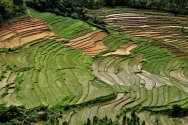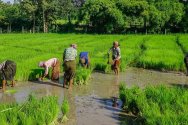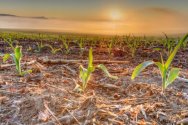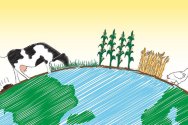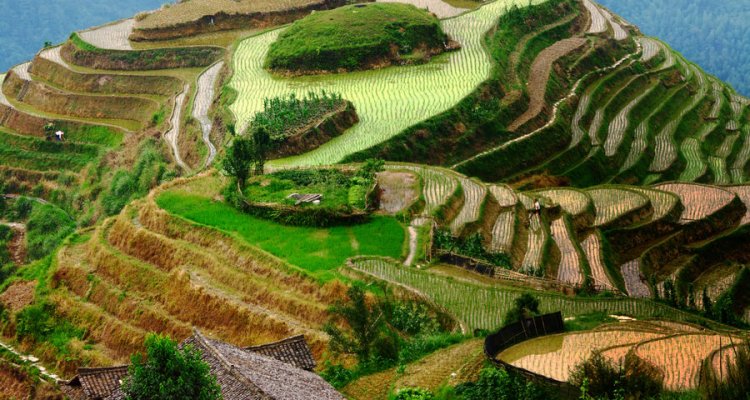
Food security and the value of water (KB-35)
The United Nations strive for ‘zero hunger’ in 2030. Meanwhile, over the past years, the number of people suffering from hunger and malnutrition has increased on a global scale. Furthermore, food systems are vulnerable to climate change and are required to feed an ever-increasing population. These facts are felt primarily by the lower and middle social strata in Africa and Asia. Providing every world citizen with sufficient and healthy nutrition demands a transition towards sustainable food systems.
Through the research programme Food security and Valuing water, Wageningen University & Research aims to develop new routes towards a sustainable food system. The main challenges in achieving this goal are the depletion of freshwater resources, climate change, land management, soil degradation, declining biodiversity, migration, the increase in agricultural production and changes in international trade. Not just the amount of food, but its availability and affordability are crucial. In this programme, we develop and asses new insights for shaping transitions towards sustainable food security.
Thematic Areas
The Food security and Valuing water programme focusses on research, development and assessment of new insights that shape transitions towards sustainable food security that can be applied in multiple middle and low-income regions across the globe. A characteristic of this programme is that we combine knowledge and experience from several disciplines in each project. In every project, researchers with backgrounds in social, technological and natural sciences work together.
The research activities in the KB35 programme are organised along three inter or transdisciplinary research areas and each consist of several projects:
- Land – water interfaces
- Changing role of (informal) actors, consumers and rural-urban linkages in transitions
- Future scenarios and navigating trade-offs and synergies
Visit Food and Water Security for more details of the individual projects.
Food System Approach as a framework
Central to our research is the Food System Approach, an interdisciplinary framework for analysing the cohesion between the different parts of the food system and its outcomes in socio-economic and environmental terms, as well as creating a better understanding of the feedback loops between the different elements of food systems. For example, we look at the efficiency of production and processing and its impact on environmental aspects (e.g. water, soil) as well as the income of the local farmers. Furthermore, we analyse the role and consequences of labour, informal actors, income, and the influence and dependence of food production on biodiversity and climate.
Food systems are highly complex systems which encompass all the stages of feeding the population: agricultural production, harvesting, packing, processing, transforming, marketing, consuming and disposing of food (UNEP, 2016; van Berkum et al., 2018).
More about Food Security and the value of water
Videos
- Participatory Seaweed research in South Sulawesi, Indonesia
- Course testimonial ‘Managing Risk in the Face of Climate Change’
- WUR Students look for solution for corona-caused hunger
- Pond aquaculture farming in Kenya
- Cage aquaculture farming in Kenya
- Kibera (Nairobi) - horticulture and aquaculture food system
- Science talks about corona virus
- Feeding Cities - the case of Kibera, Kenya
Join the Student Challenge
- QING Innovation Track - Competition for Climate Adaptation in Food Systems
- Student Challenge on Food System in 10 years time
See also
- Research Theme Food Systems
- Ocean Conference Lisbon: how marine systems contribute to the global food challenge
- Hester Biemans in Atlas about the impact of melting glaciers on food production (starting at 22.20) (only Dutch)
- Interview Ivo Demmers in Wageningen World: the road to zero hunger; 'If you zoom out, you see a lot going on at the same time.'
Bangladesh Delta Plan
On April 20 2022, a team from Bangladeshi TV visited WUR, in the context of a programme about the Delta Works in the south of the Netherlands.
The broadcast in Bangladesh on May 21 received much attention and positive
reactions.
Posters Community Day 2023
Overview of posters
- Performance and robustness of tilapia-shrimp polyculture in Java
- Deltas under Pressure: transition pathways for salinity and drought
- Food & Nutrition Security in the Global South
- Understanding midstream actors in informal sectors of the food system
- Improving understanding of the role of consumers in low- and middle-income countries
- Trade-offs and synergies in food system transition pathways
- Healthy diets
- Food Systems Across Multiple Scales
- Imagine food systems 2100
- Bridging Sustainability and Innovation: INCiTiS-FOOD's Circular Agri-Food Approach in African Cities
- Sustainable Development Goals – Enhanced monitoring through the family of Copernicus Services





